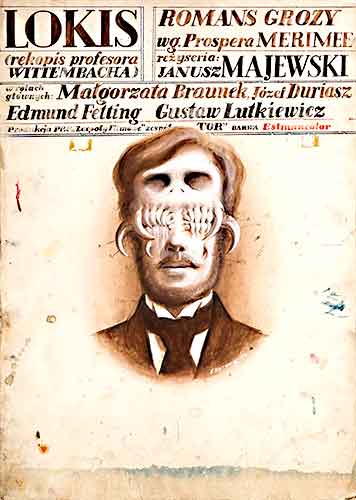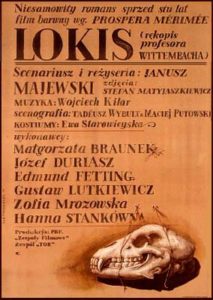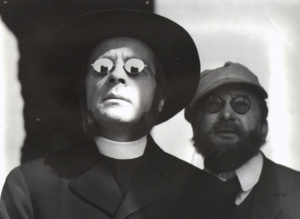 One of the most famous Polish horror films ever, LOKIS is a well made though somewhat monotonous work of atmospheric horror.
One of the most famous Polish horror films ever, LOKIS is a well made though somewhat monotonous work of atmospheric horror.
One of the most famous Polish horror films ever,
The story “Lokis,” from 1869, remains one of the most famous works by Prosper Merimee, the French dramatist best known for the novella CARMEN (the basis of the famous opera by Georges Bizet). “Lokis,” which means Bear in Lithuanian, is about a wealthy nobleman with some odd habits who is eventually revealed as a half-man, half-bear—in essence a WereBear.
This 1970 Polish film version, directed by animator turned director Janusz Majewski, follows the story fairly closely. It remains one of the best known genre films of Eastern Europe (not exactly a region noted for its horror cinema), even if it is little known in the US.
The visuals are pointed and concise, with an impressively muted, burnished glow courtesy of cinematographer Stefan Matyjaskiewicz.
Sometime in the 19th Century, Professor Wittembach, a scholarly pastor, is invited to the home of Count Szemioth, a young nobleman, to do some research in Szemioth’s father’s vast library. The trip to the Count’s home takes the pastor through a remote region of forests and swamps. He beds down for the night in a creepy old manor whose walls are decorated with monstrous pictures.
Watch Full Movie
Click to Watch the Complete Movie
Upon arriving at the Count’s mansion, Wittembach notices a madwoman outside. He also spots a man crouched in the upper branches of a nearby tree—a man who happens to look just like Count Szemioth, the nobleman who invited him to the mansion! A bit later the pastor is introduced to Dr. Froeber, who fills him in on the tragic history of the mansion. The madwoman Wittembach saw earlier is the mother of his host; years earlier she was carried off by a bear and apparently went mad after her son was born nine months later, believing him to be part bear.
The following morning Wittembach and the Count go for a walk in the surrounding woods, where the Count speaks of a legend concerning animals who congregate in packs. An old woman irritates them and the Count nearly shoots her.
During an evening banquet the frolicsome Mademoiselle Iwinska, the Count’s fiancée, performs a country waltz. The count, however, appears disturbed by it, especially when the woman speaks of a bear. Further odd behavior occurs later that night, when the pastor is awakened by the Count screaming in his sleep, and the Count screaming in his sleep, and the following day, when the Count is seen standing on the edge of a high precipice, seemingly about to leap to his death.
The accent is on atmosphere rather than incident, with an overpowering sense of brooding mystery…
Shortly thereafter the wedding between the Count and Iwinska occurs, an extremely lavish affair. Things come to a head the following night, when the wedding guests, who include Wittembach and Dr. Froeber, are called to the Count’s room, where they find the Count gone and his bride lying on the floor with her throat slashed…
From the start it’s clear that director Janusz Majewski has a unique and startling visual eye. The opening credits sequence, played over a close up of eyeglasses in front of a train window, offers an intimation of the strange and disquieting events to come. The visuals are pointed and concise, with an impressively muted, burnished glow courtesy of cinematographer Stefan Matyjaskiewicz.
Of course LOKIS, in common with the original Prosper Merimee story, is slow moving and dialogue heavy. The accent is on atmosphere rather than incident, with an overpowering sense of brooding mystery that builds to a reasonably chilling climax. There are none of the expected transformation effects or gore you’d expect from a more modern treatment of the same theme. The film is very old school, in short, which is a large part of its charm.
However, I feel LOKIS is a bit too uneventful for its own good, especially since it’s not exactly difficult figuring out the mystery at the center. A good looking, impressively mounted production this is, but viewing it requires a lot of patience!
Vital Statistics
LOKIS (LOKIS—REKOPIS PROFESORA WITTEMBACHA)
Film Polski
Director: Janusz Majewski
Screenplay: Janusz Majewski
(Based on a Story by Prosper Merimee)
Cinematography: Stefan Matyjaskiewicz
Editing: Ewa Starowieyska
Cast: Jozef Duriasz, Edmund Fetting, Gustaw Lutkiewicz, Malgorzata Braunek, Zofia Mrozowska, Hanna Stankowna, Witold Holtz

